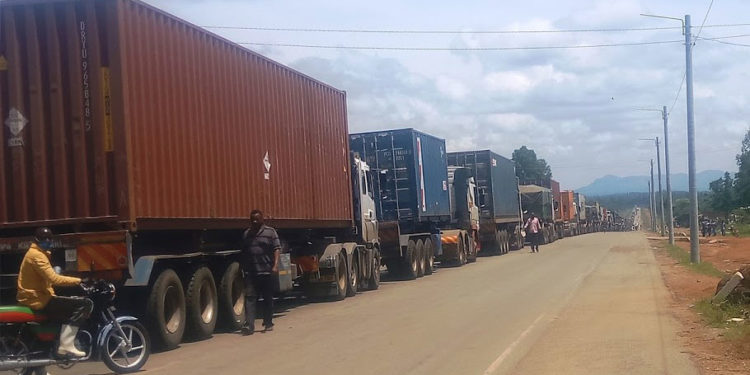Testing of truck drivers at the Malaba border post has hit a slow pace and transporters and other industry players are asking Kenya and Uganda governments to address the challenges being experienced to reduce the 50 kilometres traffic jam at the Kenyan side of the Malaba border, which they said is now very costly.
The delays is hurting players in the logistics industry and business at large due to lack of a seamless flow of the cargo that are needed to sustain the region’s economy as well as provision of essential goods.
Kenya Transporters Association (KTA) has raised a number of concerns that the two governments should address.
They range from safety issues due to presence of a huge number of oil tankers to poor enforcement of the Ministry of Health and World Health Organizations (WHO) directives such as social distancing and proper hygiene.
Interaction with the local population is going on and the community is now getting agitated due to the presence of the truck drivers in the region, KTA Chief Executive Officer said.
Last week, 11 drivers stuck at Malaba, wrote a petition they intended to submit to both the Kenya and Uganda authorities highlighting the challenges they the truck drivers are facing at the Malaba border post due to delays in testing.
Meanwhile, the Federation of East African Freight Forwarders Associations (FEAFFA), a regional body of customs agents and freight forwarders is currently negotiating with governments to find a quick solution to this impasse. In the long run, FEAFFA and other industry players have proposed a Journey Management System to assist in managing spread of the virus by truck drivers.
The Cabinet Secretary (CS) for the East Africa Community and Regional Development Mr Adan Mohammed yesterday said that the regional Heads of States in the Partner States have agreed on the harmonization of testing after a spat erupted between Kenya and Tanzania over Namanga border crossing, which has since been addressed.
“EAC has been very clear on free movement of the cargo. The drivers will only be tested at the border if they don’t have certificates from Tanzania and vice versa,” Mohammed said in a recent talk show.
He said that the free movement of goods within the region is the hallmark of the EAC integration and protection of the Common Market Protocol, adding that specific issues between member states have in the past been addressed bilaterally. However, coronavirus has exaggerated the matter.
EAC secretariat donated two mobile laboratories as part of regional efforts to contain COVID-19 with one of them being deployed at Namanga border today. The second one will be used at Naivasha ICD.
FEAFFA and other regional industry players have been lobbying Partner States to give various concessions to help the industry accommodate directives issued by WHO in tackling Covid 19 pandemic.
These measures have interrupted flow of the cargo, with serious repercussions on players in the logistics chain and once passed to the end users, will see cost of doing goods go up.
For any feedback, contacts us via editorial@feaffa.com / freightlogistics@feaffa.com /info@feaffa.com; Mobile: +254703971679 / +254733780240





